八年级英语上册教学重难点解析
- 格式:doc
- 大小:229.50 KB
- 文档页数:38

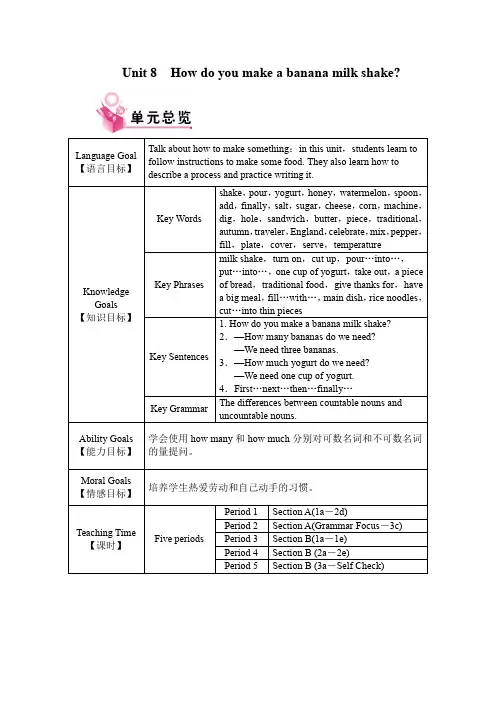
Unit 8How do you make a banana milk shake?本单元的教学围绕“谈论如何制作香蕉奶昔”这一话题展开,Section A是基本语言内容的收集和学习,这一部分引导学生通过本课的语言素材进行看图说话、句型演练、实际描述和对话表演等,使学生能够正确地使用表述如何制作香蕉奶昔过程中需要用到的词组、句型,从而熟练地谈论这一话题。
Section B是知识的扩展和综合的语言运用。
在Section A的基础上,自如地谈论“如何制作三明治”,从而进一步熟练掌握有关的英语表述方式。
这些内容都是与学生日常生活紧密相关的,学生很熟悉,也乐于去说,因此在这一课题的教学过程中,应紧密联系学生生活实际,采用多种方式,以说为主,配合听的练习,最终以对话为途径,解决本课题的中心对话。
这易于引发学生运用简单的英语进行交流,对于提高学生的综合能力,特别是说的能力很有帮助。
第一课时Section A(1a-2d)Teaching Goals【教学目标】Key words:shake,blender,peel,pour,yogurt,honey,watermelon,spoon,add,finally,saltKey phrases:milk shake,turn on,cut up,one cup of yogurt,pour…into…,put…into…Key sentences:1. How do you make a banana milk shake?2. — How many bananas do we need?— We need three bananas.3. — How much yogurt do we need?—We need one cup of yogurt.Teaching Key Points【教学重点】The vocabulary:pour,yogurt,honey,watermelon,spoon,add,finally,saltTarget language:How do you make a banana milk shake?First,peel the bananas…How many bananas do we need?We need three bananas.How much yogurt do we need?We need one cup of yogurt.Teaching Difficult Points【教学难点】1. The differences between countable nouns and uncountable nouns.2. 学会使用how many和how much分别对可数名词和不可数名词的量提问。
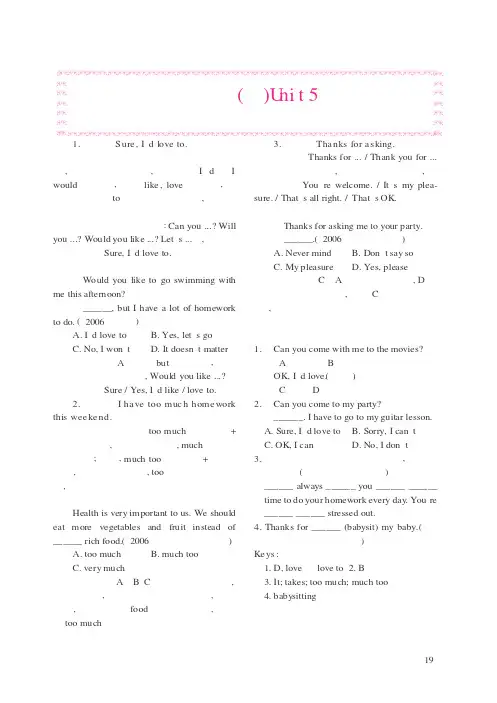
1.【原句】Sure ,I ’d love to.【讲解】这是接受别人邀请的客套话,意为“我愿意”,其中的I ’d 是I would 的缩写,常与like ,love 等连用,表达一种意愿。
to 是动词不定式符号,后面省略了动词。
表示邀请的句型还有:Can you ...?Willyou ...?Would you like...?Let ’s ...等,这些句型都可以用Sure,I ’d love to.作答。
【真题】—Would you like to go swimming withme this afternoon?—______,but I have a lot of homework to do.(2006南京市)A.I ’d love toB.Yes,let ’s goC.No,I won ’tD.It doesn ’t matter 【点拨】选A 。
连词but 表示转折,故空白处应当用肯定回答,Would you like ...?的肯定答语是Sure /Yes,I ’d like /love to.。
2.【原句】I ha ve too muc h home work this wee ke nd.【讲解】本句中的too much 是“副词+形容词”结构,意为“太多的”,much 修饰不可数名词;另外,much too 是“副词+副词”结构,意为“太……”,too 修饰形容词或副词,不修饰名词。
【真题】Health is very important to us.We shouldeat more vegetables and fruit instead of ______rich food.(2006黑龙江省哈尔滨市)A.too muchB.much tooC.very much【点拨】选A 。
B 、C 项常用作副词结构,用来作状语,修饰形容词、副词或动词,表示程度,而本句中的food 是不可数名词,应当用too much 。
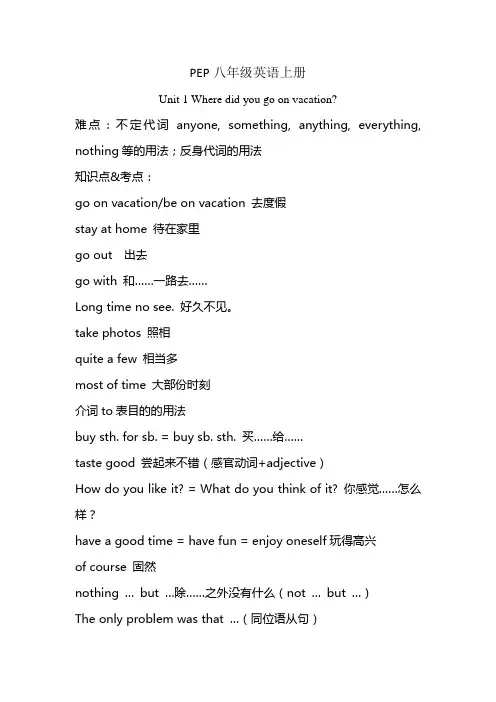
PEP八年级英语上册Unit 1 Where did you go on vacation?难点:不定代词anyone, something, anything, everything, nothing等的用法;反身代词的用法知识点&考点:go on vacation/be on vacation 去度假stay at home 待在家里go out 出去go with 和……一路去……Long time no see. 好久不见。
take photos 照相quite a few 相当多most of time 大部份时刻介词to表目的的用法buy sth. for sb. = buy sb. sth. 买……给……taste good 尝起来不错(感官动词+adjective)How do you like it? = What do you think of it? 你感觉……怎么样?have a good time = have fun = enjoy oneself玩得高兴of course 固然nothing …but …除……之外没有什么(not …but …)The only problem was that …(同位语从句)seem to be/seem + adj. 看起来……keep a diary 记日记+ at + 小地址arrive+ in + 大地址decide to do 决定做某事try doing sth. 尝试做某事try to do sth. 尽力做某事feel like 感觉到feel like + n./ v-ing想要……ride …to …骑……到……许多的:a lot of + 可数名词lots of + 可数or不可数名词I wonder that …我想明白……in the past 在过去enjoy doing sth. 享受做某事walk around 处处逛逛感叹句:What + 冠词+ adj. + n. + (it is) = How + adj. + 冠词+ n. + (it is)start doing sth. 开始做某事stop doing sth. 停止做某事finish doing sth. 终止做某事because & so(不可同用)wait for …等待……because of + n.a little/ a few 一些(二者的区别,和与little/few 的区别)enough + n. / adj. + enoughas + adj./adv. + as 和……一样……one bowl of …一碗……along the way 沿着这条路时刻段+ later = after + 时刻段……以后other, others, the other, the others, anotheron trip 在旅途中find out 找到,找出/ find 寻觅/ look for 寻觅so + adj. + that + 从句如此……以致……tell sb. (not) to do sth. 告知某人(不要)做某事keep doing sth. / go on doing sth. 继续做某事keep sth. + adj. 使……维持……状态up and down (人)来来往往;(物)上上下下in excitement = excitedly 兴奋地come up / come out / come on / come inforget to do sth. 忘记做某事forget doing sth. 忘记做过某事like / dislike + n. / v-ing喜爱/不喜爱某物/做某事something + adj. ……的情形Why not + v. = Why don’t you + v. 什么缘故不……呢?Unit 2 How often do you exercise?重点:1. How often 句型的运用;2. 六个频度副词never, hardlyever, sometimes, often, usually, always的不同、明白得及利用;3. 频率数词once, twice等的熟悉和运用;4. 一样此刻时不同人称呼语形式的转变及一样疑问句的问答。
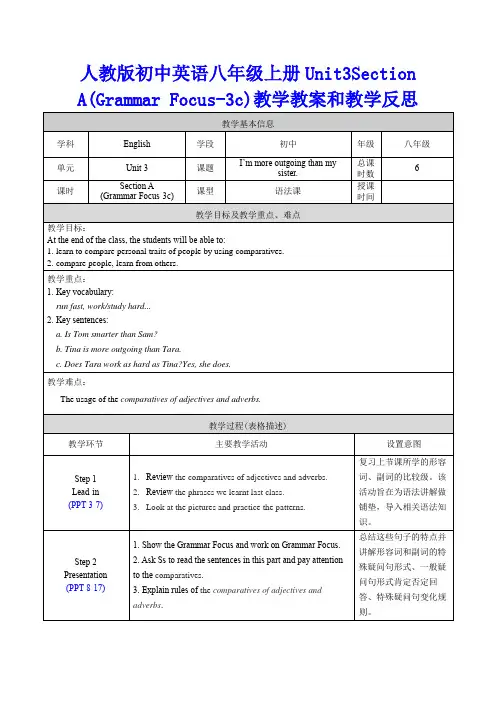
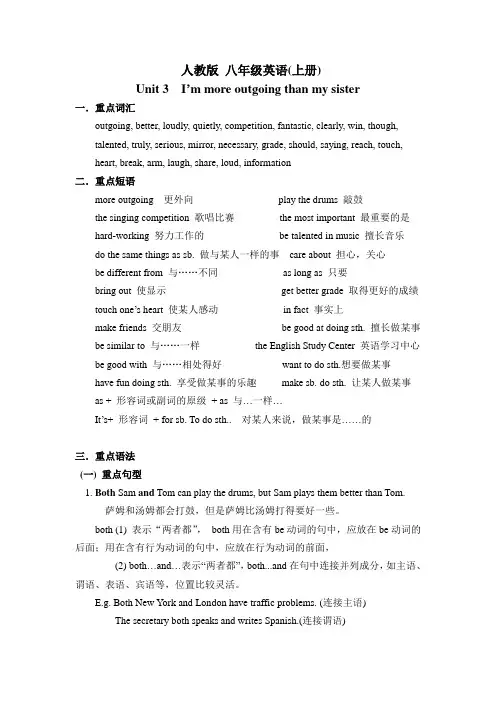
人教版八年级英语(上册)Unit 3 I’m more outgoing than my sister一.重点词汇outgoing, better, loudly, quietly, competition, fantastic, clearly, win, though,talented, truly, serious, mirror, necessary, grade, should, saying, reach, touch,heart, break, arm, laugh, share, loud, information二.重点短语more outgoing 更外向play the drums 敲鼓the singing competition 歌唱比赛the most important 最重要的是hard-working 努力工作的be talented in music 擅长音乐do the same things as sb. 做与某人一样的事care about 担心,关心be different from 与……不同as long as 只要bring out 使显示get better grade 取得更好的成绩touch one’s heart 使某人感动in fact 事实上make friends 交朋友be good at doing sth. 擅长做某事be similar to 与……一样the English Study Center 英语学习中心be good with 与……相处得好want to do sth.想要做某事have fun doing sth. 享受做某事的乐趣make sb. do sth. 让某人做某事as + 形容词或副词的原级+ as 与…一样…It’s+ 形容词+ for sb. To do sth.. 对某人来说,做某事是……的三.重点语法(一) 重点句型1. Both Sam and Tom can play the drums, but Sam plays them better than Tom.萨姆和汤姆都会打鼓,但是萨姆比汤姆打得要好一些。

八年级英语上册总复习教案──八年级上册总复习一、教学目标:1. 知识与技能:通过复习,使学生掌握八年级上册英语课程中的重点单词、短语、句型和语法点。
2. 过程与方法:通过各种教学活动,提高学生的英语听说读写能力,为提高学生的英语综合素质奠定基础。
3. 情感态度与价值观:激发学生学习英语的兴趣,培养他们积极向上的学习态度,提高他们的自信心。
二、教学内容:1. 单词和短语:复习八年级上册课本中出现的高频单词和短语。
2. 句型:复习各种基本句型,如疑问句、否定句、祈使句等。
3. 语法点:复习时态、被动语态、比较级和最高级等语法点。
三、教学过程:1. 课堂导入:通过与学生互动,引起学生对复习英语的兴趣。
2. 新课导入:教师引导学生复习单词和短语,让学生通过例句来理解和运用这些单词和短语。
3. 课堂活动:通过小组讨论、角色扮演等方式,让学生运用所学句型进行交流。
4. 语法讲解:教师通过讲解和示例,帮助学生复习语法点。
5. 课堂练习:教师设计各种练习题,让学生巩固所学知识。
6. 总结与布置作业:教师对本节课的内容进行总结,布置相应的作业,让学生巩固所学知识。
四、教学评价:1. 课堂参与度:观察学生在课堂上的积极参与程度,了解他们的学习状态。
2. 作业完成情况:检查学生作业的完成情况,了解他们对所学知识的掌握程度。
3. 测验成绩:通过测验,了解学生在复习阶段的学习成果。
五、教学资源:1. 教材:八年级上册英语教材。
2. 课件:教师自制的课件,用于辅助教学。
3. 练习题:教师设计的各种练习题,用于巩固所学知识。
4. 教学工具:黑板、粉笔、多媒体设备等。
六、教学策略:1. 任务型教学法:通过设计各种真实的任务,让学生在完成任务的过程中运用所学知识,提高他们的实际运用能力。
2. 交际型教学法:鼓励学生进行互动交流,提高他们的口语表达能力和听力理解能力。
3. 情境教学法:创设各种真实的语境,让学生在语境中学习和运用英语。
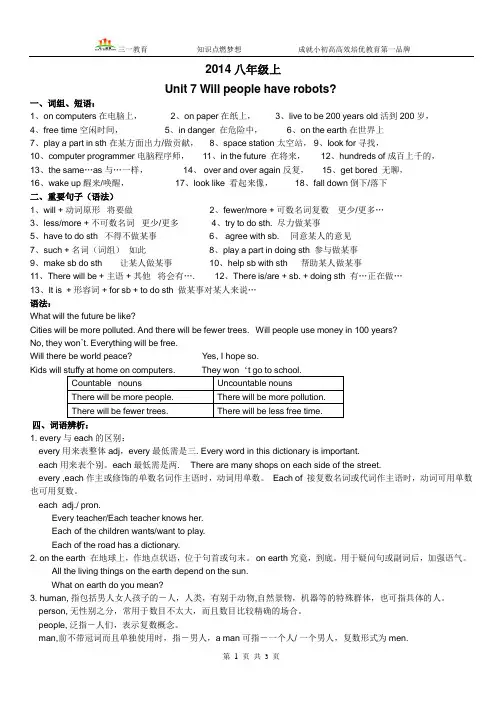
2014八年级上Unit7Will people have robots?一、词组、短语:1、on computers在电脑上,2、on paper在纸上,3、live to be200years old活到200岁,4、free time空闲时间,5、in danger在危险中,6、on the earth在世界上7、play a part in sth在某方面出力/做贡献,8、space station太空站,9、look for寻找,10、computer programmer电脑程序师,11、in the future在将来,12、hundreds of成百上千的,13、the same…as与…一样,14、over and over again反复,15、get bored无聊,16、wake up醒来/唤醒,17、look like看起来像,18、fall down倒下/落下二、重要句子(语法)1、will+动词原形将要做2、fewer/more+可数名词复数更少/更多…3、less/more+不可数名词更少/更多4、try to do sth.尽力做某事5、have to do sth不得不做某事6、agree with sb.同意某人的意见7、such+名词(词组)如此8、play a part in doing sth参与做某事9、make sb do sth让某人做某事10、help sb with sth帮助某人做某事11、There will be+主语+其他将会有….12、There is/are+sb.+doing sth有…正在做…13、It is+形容词+for sb+to do sth做某事对某人来说…语法:What will the future be like?Cities will be more polluted.And there will be fewer trees.Will people use money in100years?No,they won’t.Everything will be free.Will there be world peace?Yes,I hope so.Kids will四、词语辨析:1.every与each的区别:every用来表整体adj,every最低需是三. Every word in this dictionary is important.each用来表个别。
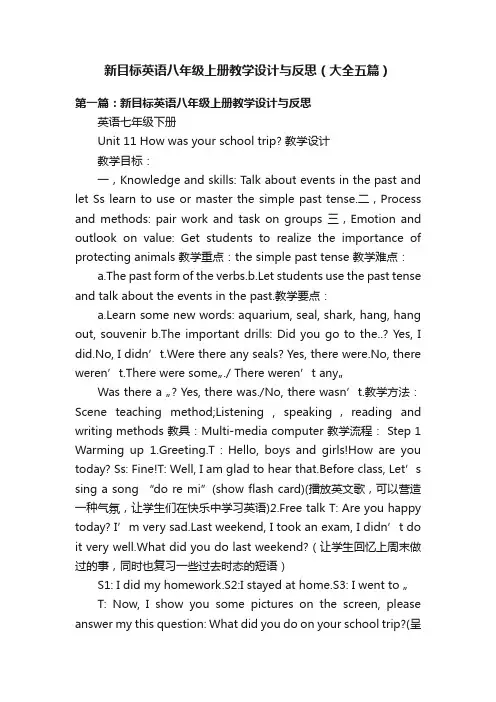
新目标英语八年级上册教学设计与反思(大全五篇)第一篇:新目标英语八年级上册教学设计与反思英语七年级下册Unit 11 How was your school trip? 教学设计教学目标:一,Knowledge and skills: Talk about events in the past and let Ss learn to use or master the simple past tense.二,Process and methods: pair work and task on groups 三,Emotion and outlook on value: Get students to realize the importance of protecting animals 教学重点:the simple past tense 教学难点:a.The past form of the verbs.b.Let students use the past tense and talk about the events in the past.教学要点:a.Learn some new words: aquarium, seal, shark, hang, hang out, souvenirb.The important drills: Did you go to the..? Yes, I did.No, I didn’t.Were there any seals? Yes, there were.No, there weren’t.There were some…./ There weren’t any…Was there a …? Yes, there was./No, there wasn’t.教学方法:Scene teaching method;Listening , speaking,reading and writing methods 教具:Multi-media computer 教学流程: Step 1 Warming up 1.Greeting.T:Hello, boys and girls!How are you today? Ss: Fine!T: Well, I am glad to hear that.Before class, Let’s sing a song “do re mi”(show flash card)(播放英文歌,可以营造一种气氛,让学生们在快乐中学习英语)2.Free talk T: Are you happy today? I’m very st weekend, I took an exam, I didn’t do it very well.What did you do last weekend?(让学生回忆上周末做过的事,同时也复习一些过去时态的短语)S1: I did my homework.S2:I stayed at home.S3: I went to …T: Now, I show you some pictures on the screen, please answer my this question: What did you do on your school trip?(呈现图片,操练本单元1a,1b部分已学过的过去时态短语)S1: I went to the beach.T: Now look at these pictures, let’s work in pairs, ask and answer freely.S1: What did you do on your school trip? S2: I took photos S3:….S4:…..Step 2 pre-task 1.lead in T: On National Day, I had a trip.During the trip I did something interesting.Do you want to know about my trip.Let’s enjoy a video.(根据学生的好奇心理,本人以自己的旅行经历来导出本课重点单词及词组,首先本人采用播放录像的方式,使同学们直观的感受水族馆的氛围)Ss: Read after me(学读新词aquarium, shark, seal, hang out, souvenir)2.Memory test Ss: remember the words and phrases 3.Presentation T : The aquarium is very wonderful, Did you go to the aquarium?(很自然的导入到过去时的一般疑问句)Ss: Yes, I did./ No, I didn’t.T: Were there any sharks in the aquarium?(呈现新句型)S1:Yes, there were.There were some sharks in the aquarium.T : Did you go to the zoo? S2: Yes, I did.T :Were there any seals in the zoo? S2: No, there weren’t.T : I show you a video about an animal, guess!What animals did we see? Was there a seal in the aquarium? Ss: Yes.There was.4.practice T : OK, Let’s read these new sentences.Were there any sharks in the aquarium? Yes, there were.There were some sharks in the aquarium./no, there weren’t.Was there a seal in the aquarium? Yes.There was./No, there wasn’t(老师在黑板上呈现板书,学生们跟读以达到反复操练本单元重点句型,以及肯定、否定回答的目的)T: Use some pictures on the screen to ask and answer in pairs.(给出几组图片,让学生们根据图片内容,用所学句型进行对话,目的是想让学生们熟练操练这个句型,更突出本节课重点句型的学习,为下面的活动打好基础。
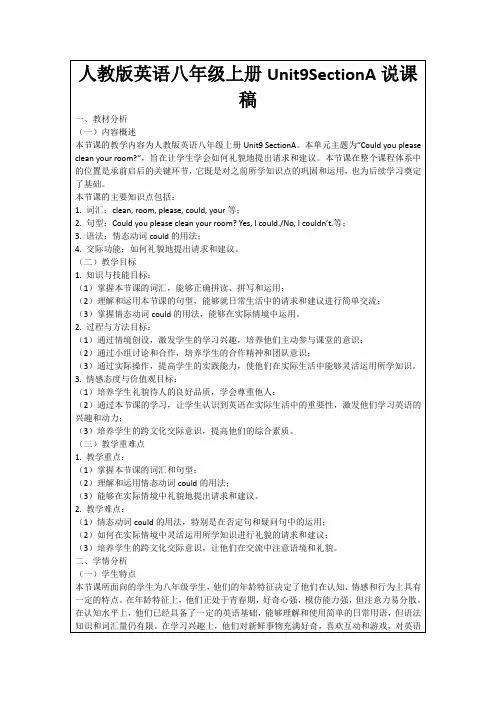
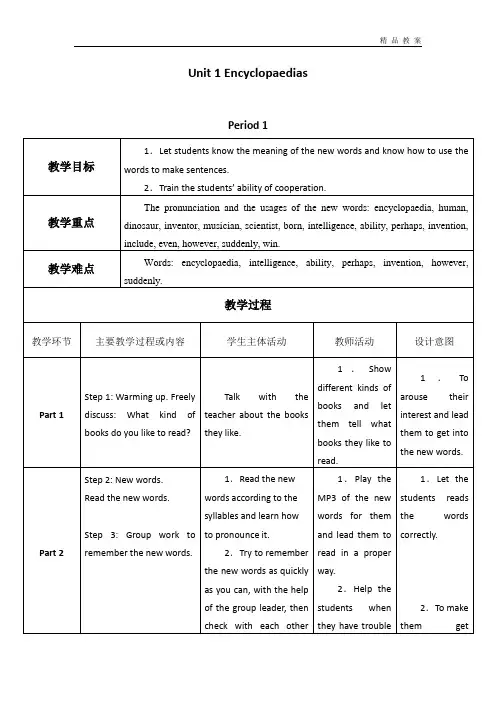
Unit 1 EncyclopaediasPeriod 1Unit 1 EncyclopaediasPeriod 2Unit 1 EncyclopaediasPeriod 3Unit 1 EncyclopaediasPeriod 4Unit 1 EncyclopaediasPeriod 5Unit 1 EncyclopaediasPeriod 6Unit 2 NumbersUnit 3 ComputersTeaching aims:学习掌握形容词比较级和最高级。
Important Points:形容词比较级和最高级的用法。
Difficult Points:形容词比较级和最高级的用法。
Teaching Procedure:Ⅰ.Learning Strategies1.Self-study2.CooperationⅡ.Learning Preparation1.Daily sentences:All roads lead to Rome.条条大路通罗马。
2.Daily quiz:A.from B.think C.said D.practice E. food F. news A: Hello, Peter, I have some good__________.B: What is it?A: A foreign lady will teach us English next term.B: Where does she come_____________?A: Canada. It's _________that she is an excellent teacher.B: Wonderful! I ________ we can make great progress (进步) in English.A: I think so. We can _________ speaking English with her in our free time.B: That sounds good!Ⅲ.Entailed Teaching ProceduresSelf-observationThe comparative of adjectives & the superlative of adjectives.形容词的比较级&形容词的最高级We use the comparative of adjectives when we compare two things.We use the superlative of adjectives when we compare more than two persons or thingsActivity 1: 看下列形容词的比较级,找规律。
八年级英语上册第三单元-教学设计【教学参考】新人教版八年级英语上册第三单元教学设计Unit 3 I’m more outgoing than my sister.Section A 1 (1a-2d)一、教学目标:1. 语言知识目标:1) 能掌握以下单词:outgoing, better, loudly, quietly, hard-working, competition, fantastic, which, clearly, win能掌握以下句型:①Tina is taller than Tara.②Sam has longer hair than Tom.③She also sings more loudly than Tara.2) 能掌握以下语法:①形容词或副词比较级形式的构成。
②表示两者进行比较的句式结构。
2. 情感态度价值观目标:能对人物的外表进行描绘,个性进行比较。
二、教学重难点1. 教学重点:1) 形容词或副词比较级形式的构成。
2) 表示两者进行比较的句式结构。
2. 教学难点:He has shorter hair than Sam.Is Tom smarter than Tim?She also sings more loudly than Tara.三、教学过程Ⅰ. Lead-in1. Ask Ss to write down as many adj. about people as possible. Check the adj. Ss write and we can group them into some pairs, like: [Section A 1a]tall --- short; thin --- heavy, long hair --- short hair, calm --- wild …Give Ss an example by comparing Old Henry and Santa Claus.e.g. Santa Claus is older than Henry. Henry is taller than Santa Claus.Henry is younger than Santa Claus. Santa Claus is younger than Henry.Ⅱ. PresentationAsk Ss to see the pix about apples and pears to see the differences. Then compare some of their things with each other.e.g. The apples are bigger than the pears.The pears are more delicious than the apples.Summarize the Comparatives. Group competition.A + be(V) + 比较级 + than + B.Ⅲ. Game (I and my desk mate)Ask Ss to compare with their partners and find out the differences.e.g. She is heavier than me. I am more outgoing than her.She gets up earlier than me. I run faster than her.Ⅳ. ListeningThen listen to the recording. Ask Ss to number the twins.Check the answers.Ⅴ. Pair work1. Point out the sample conversation in activity 1c.Practice the conversation then make conversations about the other twins.A: That's Tara, isn't it?B: No, it isn't. It's Tina. Tina is taller than Tara. And she also sings more loudly than Tara.2. Say, now work with a partner. Make your own conversation about the twins.3. Ask several pairs to say one or more of their conversations.Ⅵ. Grammar形容词或副词的比较级形式:tall tallerfast faster(一般在词尾 + er )nice nicer(以不发音的字母 e 结尾的 + r )thin thinner(重读闭音节词词尾只有一个辅音字母时,先双写辅音字母再 + er)early earlier(以辅音字母 + y 结尾的单词,变 y 为 i + er )outgoing more outgoing(多音节词和部分双音节词前加more)Ⅶ. Listening1. Work on 2a:Point out the two columns and read the headings: -er, -ier and more. Then point out the words in the box. Read them.Say, now listen and write the –er and –ier words in the first column and the words that use more in the second column.2a Listen. Are the words in the box used with –(i)er or more? Complete the chart.Play the recording and check the answers.2. Listen again and complete the sentences.• I'm ______________ than Tara. I'm __________ and _______ too.• ______ can _________ and ___________ than me.• Who's __________________ at school?• Tina thinks she _____________ than me, but I ______ as ______ as Tina. But she's _______ than me.• I think I'm ______ than Tara. She always ______________ than me.3. Work on 2b.Point out the picture and the two boxes with the headings Tina is and Tara is. Say, listen to the recording. Write word in the boxes. The words are from the list in activity 2a.2b Listen. How are Tina and Tara different?Tina …is more outgoing than Tara.Tara …works as hard as Tina.Play the recording and check the answers.Ⅷ. Pair work1. Point out the chart in activity 2c. Say, Make your own conversations according to the information. Ask pairs to continue on their own.Student A, look at the chart on the right. Student B, look at the chart on page 81. Ask and answer questions about Sam and Tom.A: Is Tom funnier than Sam?B: No, he isn't. Sam is funnier than Tom.2. Ss practice their conversations.3. Ask some pairs to act out their conversations.IX. Language pointsTina thinks she works harderthan me, but I work as hard as Tina.as ... as ... 意为“像 / 和……一样……”,两个as 中间用形容词或副词的原级。
译林英语八年级上册教案(精选5篇)译林英语八年级上册教案(精选篇1)一、说教材1、教材内容及地位本节课的主要内容是新目标英语八年级上册第2单元第一课时,教材是以what’s the matter ?为中心话题,描述身体不适和提出建议展开,学习和运用“what’s the matter ?”和“what should…do?”让学生学会描述身体的不适和提出建议,本课教材内容与学生的实际生活密切相关,易于引出学生运用简单的英语进行交际和交流,在学习活动中,学生通过交换对身体不适的描述及建议,促进学生之间和师生之间的情感交流,增进情谊。
第一课时主要学习的内容是学习有关身体部位的单词,学习“what’s the matter ?”和“what should …do?”句型。
2、说教学目标(1)知识目标:学习掌握有关身体的词汇以及有关疾病的词汇,并学会描述身体的不适和提出建议。
(2)能力目标:听懂本课学习活动中的问题及回答,能在本课的任务型活动中进行简单的交流,能正确朗读本的对和句型,能写出本课的单词和句型。
(3)情感目标:通过描述自己的身体的不适提出建议,表达自己的看法,使学生在人际交往中学会关心别人,增进情谊。
(4)文化意识目标:用恰当的方式表达自己的看法,增进人际交往中学会关心别人的能力,了解英美国家询问和表达身体不适的习惯,培养世界意识。
3、说教学重难点重点:本节课主要学习身体部位的单词和一些疾病的词汇,以及身体不适的表达及建议。
难点:身体不适的表达及建议二、说学情初二年级的学生对英语已经有了一定的基础,但本地区部分学生对学习英语的兴趣不是很浓,在学习中,他们更喜欢从游戏中或活动中学习,这样更能提高他们的学习兴趣,让他们更轻松地掌握英语知识。
三、说教法作为教学的引导着,我遵循新课程“学生是学习的主人,一切的教学活动设计在以学生为本”的教学理念,坚持“为学生的发展,必须培养学生的自主性、能动性、独立性和创造性”的教学原则。
Unit 10 If you go to the party , you’ll have a great time!课文重难点讲解Section A1. If you go to the party , you’ll have a great time!【解析】have a great/good/ nice/ wonderful time = have fun= enjoy oneself 玩得高兴( )①They had a great time there last night.A. had a funB. had a great funC. enjoyed themselvesD. enjoyed a good time( )②–Did Lucy have a good time? --Yes, She enjoyed ______ very much.A. himselfB. herselfC. themselvesD. itself2. I think I’ll wear jeans to the party. 我想我将穿牛仔裤去参加聚会。
【解析1】wear/put on/dress 穿(1) wear =be in 穿,指穿的状态【延续性动词】【山东济宁】Most British high school children _____ uniforms at school.A. wearB. dressC. put onD. dress up(2) put on 穿,指穿的动作【短暂性动词】It’s cold outside. Put on your coat.(3) dress v 穿,后跟人做宾语。
◆dress sb. 给某人穿衣服dress oneself 给某人自己穿衣服【2014湖南长沙】21. My sister is old enough to dress______now.A. himselfB. herselfC. myself【解析2】jeans n 牛仔裤 a pair of jeans 一条牛仔裤【注】jeans, trousers, shorts 等经常用复数形式()-- We can’t wear jeans to school. --______?A. Why notB. WhyC. Yes, we notD. Can we3. I think I’ll stay at home.【解析】stay at home 带在家里4. I think I’ll take the bus to the party. 我想我将乘公共汽车去参加聚会。
Unit3 Topic1 课文重难点讲解【1】Maybe I need a change.也许我需要改变一下。
(1) maybe1) adv. 意为“也许,或许,大概〞,用来表示推测,在句中作状语,含义与perhaps 一样。
如:— Will they come? 他们会来吗?— Maybe. 也许。
Maybe he will be a little late. 或许他会迟到一会儿。
2) maybe不同于may be。
may be是情态动词,may+系动词be,意为“或许〔是〕〞,作谓语,表示可能性。
其后可用形容词、名词、代词或介词短语等作表语。
如:It may be true. 那或许是真的。
He may be a little late.他或许会迟到一会儿。
(2) change1) 名词,这里有“换口味〞的含义。
如:Let's go to a movie tonight for a change!我们今晚换换活动,去看电影吧!2) change作名词,还有“零钱,找零〞的意思。
如:Here is your change. 这是找你的零钱。
3) change作动词时,意为“改变,变化〞。
如:The town has changed from a small fishing port to a bustling tourist center. 这个小镇从一个小渔港变成了热闹的旅游中心。
【2】I am interested in playing basketball. 我对篮球运动感兴趣。
interested adj.意为“感兴趣的〞,常用于be interested in这一构造中,表示“对……感兴趣〞。
如:She is interested in music.她对音乐感兴趣。
【链接】interest与interesting(1) interest n.1)兴趣,趣味,关心,作不可数名词。
八年级英语上册复习教案第一章:Unit 1 How often do you exercise?1.1 教学目标掌握频率副词和一般现在时的肯定句及疑问句的构成。
学会用一般现在时谈论日常习惯和频率副词。
能正确回答关于日常习惯的一般现在时疑问句。
1.2 教学内容频率副词:always, usually, often, sometimes, rarely, never.一般现在时的肯定句:Subject + verb(s/es) + other words.一般现在时的疑问句:Do/Does/Did + Subject + verb(s/es) + other words?1.3 教学活动复习频率副词和一般现在时的肯定句。
学生互相提问关于日常习惯的一般现在时疑问句,并回答。
老师给出一些日常习惯的句子,学生判断句子是否使用了一般现在时。
第二章:Unit 2 Do you like pop music?2.1 教学目标掌握形容词最高级的构成和用法。
学会用形容词最高级描述音乐、电影等喜好。
2.2 教学内容形容词最高级的构成:adjective + -est + other words.形容词最高级的疑问句:Which + noun + adjective(最高级) + other words?2.3 教学活动复习形容词最高级的构成和用法。
第三章:Unit 3 Could you please write slower?3.1 教学目标掌握情态动词could的用法。
学会用情态动词could提出请求或建议。
能正确回答关于请求或建议的情态动词could疑问句。
3.2 教学内容情态动词could的用法:用来提出请求、建议或可能性。
情态动词could的肯定句:Subject + could + verb + other words. 情态动词could的疑问句:Could + Subject + verb + other words?3.3 教学活动复习情态动词could的用法。
八年级英语上册教学重难点解析 Nothing is difficult if you work hard. Lesson plan ( by Cailing Lee ) Time: 40 minutes Class: Class 155 and 160 , Grade eight, E’jia Middle School. Content: Unit 1 how often do you exercise? Properties: cards, pictures and a tape recorder. Teaching objectives a) Words &phrases: how often, hardly, twice, once, difference, look after , although, etc . b) Learn to talk about how often do you do things. c) 一些表示频率的副词: Always, usually, often, never, hardly ever, sometimes. d) 句子结构: What do you usually do on weekends? How often ???? 及回答. Key words and Key Phrases 1. one -----once一次-----first 第一 2. two -----twice 两次-----second 第二 3. three-----third 第三-----three times 4. health 健康(名)----healthy 健康的(形)-----unhealthy不健康(形) 5. hard 难的---hardly 几乎不 6. ever曾经 ----never 从不 7. different不同的(形)---difference 不同(名) 8. active活跃的;积极的 ----activity 活动 9. little –less ---least 10. good ---better –best 11. much/ more –most 12. junk food 垃圾食物 13. eating habit 饮食习惯 14. healthy lifestyle 健康生活方式 15. animal world 动物世界 16. high school 高中 17. student activity survey 学生活动调杳 18. the result for / of ---- ----的结果 19. as a result of ----- 由于-----的结果 20. get good grades 获得好的成绩 21. keep sb. in good health 保持某人处于健康的状况 22. look after 照顾,照料= take care of 23. surf the internet 网上冲浪,上网 24. play sports 做运动 25. play soccer 踢足球 26. watch TV 看电视 27. write down 记下 28. do some exercise 做运动 29. do homework 做家庭作业 30. do housework 做家务 31. go to the movies 去看电影 32. go skateboarding 去踩滑板 33. like doing sth. 喜欢去做某事 34. like to do sth. 喜欢去做某事 35. want sb. to do sth. 想要某人去做某事 36. help sb. (to) do sth. 帮助某人做某事 37. try to so sth. 尽力去做某事 38. be good for 对-----有益 39. be bad for 对-----有坏处 = be not good at 40. be good at 在-----方面学得好 41. be different from 与-----不相同 = be not the same as 42. be the same as 与-----完全相同 43. how often 多久一次 44. how many 多少 45. how many hours多少个小时 46. hardly ever 几乎不,很少=seldom 47. every day 每天 48. once a day 一天一次 49. twice a week 一周两次 50. three times a month一个月三次 51. four or five times a term 一学期四或五次 52. five times two years 两年五次 53. on weekdays 在工作日 54. on weekends 在周末 55. as for 至于 56. of course 当然 57. kind of 有几分,稍微 = a little bit 58. a lot of 许多= many = lots of Important and difficult points 1. -----What do you usually do on weekends? ---- I usually play soccer. 2. -----What do they do on weekends? -----They often go to the movies. 3. -----What does he do on weekends? -----He sometimes watches TV. 4. -----What does she sometimes do on weekends? -----She sometimes surfs the Internet. 5. -----How often do you exercise? -----I exercise every day / Once a week / Twice a month / Three times a month / Three or four times a month. / once a month. 6. -----How often does Cheng Watch TV? -----He watches TV twice a week. 7. ----- How often does she eat vegetables? -----She eats vegetables three times a day. 8. -----What’s your favorite program? -----It’s Animal World. 9. -----How many hours do you sleep every night? -----I sleep nine hours every night. 10. -----The results for ― watching TV‖ are interesting. 11. -----My mother wants me to drink it. 12. -----she says it is good for my health. 13. My eating habits are pretty good. 14. I try to eat a lot of vegetables. 15. My healthy lifestyle helps me get good grades. 16. Good food and exercise help me to study better. 17. I think I’m kind of unhealthy. 18. Mom wants me to get up at 6:00 and play ping-pong with her. 19. A lot of vegetables help you to keep in good health.
1. How often do you exercise? → How often + 助动词do(does或did) + 主语 + do sth. ? 疑问词how often是问频率(多经常), 在这里助动词do(does或did) 是起帮助构成疑问的作用 Every day / Once a week / Twice a month / Three times a month / Three or four times a month. 2. What do you usually do on weekends? 第一个do 为助动词, 在这起帮助构成疑问的作用;而第二个 do 则是实义动词。 I usually play soccer. 3. What’s your favorite program ? It’s Animal World. 4. What do students do at Green High School ? 第一个do 为助动词, 在这起帮助构成疑问的作用;而第二个 do 则是实义动词。 5. As for homework, most students do homework every day . as for...意思是“至于;关于”,常用于句首作状语,其后跟名词、代词或动词的-ing形式(即动名词)。如: As for him,I never want to see him here. 至于他,我永远不希望在这里见到。 As for the story,you'd better not believe it. 关于那故事,你最好不要相信。 6. The results for ― watch TV ‖ are interesting . 7. Mom wants me to get up at 6:00 and play ping-pong with her. → want to do sth.意思是“想要做某事”;want sb. to do sth.意思是“想要某人做某事”。如: Do you want to go to the movies with me?你想和我一起去看电影吗? The teacher doesn't want us to eat hamburgers.老师不想让我们吃汉堡包。 8. She says it’s good for my health . → be good for...表示“对„„有益(有好处)”。其反义为:be bad for...。(这里for 是介词,后跟名词、代词或动名词)如: It's good for us to do more reading. 多读书对我们有好处。 Reading in bed is bad for your eyes.在床上读书对你的眼睛有害。 9. How many hours do you sleep every night ? 10. I exercise every day , usually when I come home from school . 11. My eating habits are pretty good . 这里pretty相当于very 。 12. I try to eat a lot of vegetables, usually ten to eleven times a week . → try to do sth.表示“ 尽力做某事 ” ,不包含是否成功的意思 / try doing sth. 表示“ (用某一办法)试着去做某事”。 如:You’d better try doing the experiment in another way. 你最好试试用另一种方法做这个试验。 13. My healthy lifestyle helps me get good grades. → help sb.(to) do sth.帮助某人做某事 14. Good food and exercise help me to study better. → help sb. (to) do sth.帮助某人做某事 / 这里better是well的比较级,而不是good的比较级 15. Is her lifestyle the same as yours or different? =Is her lifestyle the same as your lifestyle or is her lifestyle different from your lifestyle ? → be the same as „ / be different from „ 16. I think I’m kind of unhealthy. kind of = a little / a kind of 意思是“一种” 17. What sports do you play? 18. A lot of vegetables help you to keep in good health. keep in good health = keep healthy = stay healthy